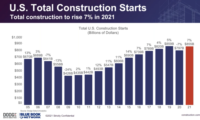Inflation, rising interest rates and a skilled labor shortage continue heading into the second quarter, and a recession ahead is still likely, according to Anirban Basu, chief economist at Associated Builders and Contractors. “The war on inflation is ongoing, it’s not yet won,” Basu said during the association's 2023 Q1 Construction Economic Update and Forecast webinar on Apr. 5. “I think recession is coming.”
In the residential market, multifamily spending is growing. However, due to high mortgage rates, sales of single-family homes have fallen, resulting in a drop in builders applying for permits to build new structures.
Non-residential construction spending increased 11% overall during the period between the start of the COVID-19 pandemic in February 2020 and February 2023, according to the U.S. Census Bureau. Manufacturing spending has risen a whopping 81.4%, while commercial and sewage and waste disposal are up 35.4% and 30%, respectively. Office work is down 0.9% in the same time period, but Basu notes that this is due to data centers being grouped in the weaker category of traditional office space. Educational, power and public safety spending also declined.
Despite the overall increase, “hidden by this headline number is the fact that in some of these categories, we still see abundant inflation,” Basu said.
An ABC confidence survey indicates that contractors still feel confident going into the next quarter. “As much as costs have risen, as much as interest rates have risen, the average ABC contractor still expects more profitability over the next six months,” the association said.
Basu disagreed, pointing to several indicators that a recession is looming. Most notably, a one-year treasury bond currently has a higher interest rate than a 10-year bond, he said. Apart from the 2020 recession caused by the pandemic, this has been “a flawless predictor of recession for decades,” Basu explained. “I think that’s where we’re headed again.”
.png?1680777472)


.png?height=200&t=1671117701&width=200)
.png?height=200&t=1659013137&width=200)

Post a comment to this article
Report Abusive Comment